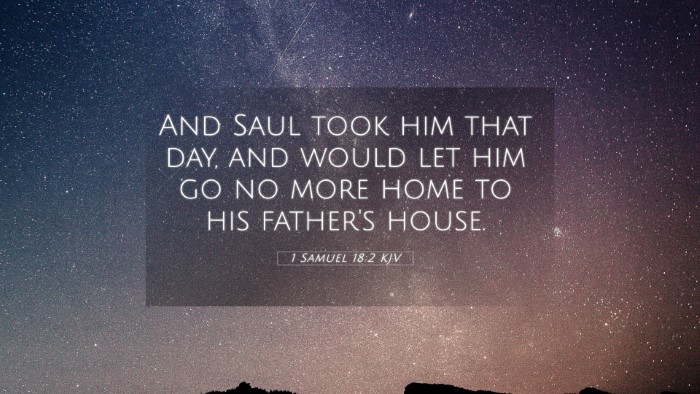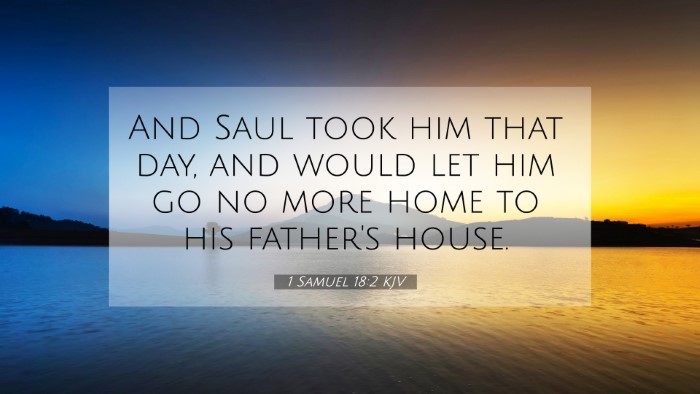Understanding 1 Samuel 18:2
The verse 1 Samuel 18:2 states: "And Saul took him that day, and would let him go no more home to his father’s house." This verse marks a significant moment in the narrative of David and Saul, indicating a pivotal shift in their relationship and David's destiny.
This brief statement encapsulates the intense connection that forms between Saul and David following David's victory over Goliath. Here, we explore the meanings derived from public domain commentaries to provide a richer understanding of this scripture.
Insights from Expert Commentaries
Combining insights from renowned commentaries such as those by Matthew Henry, Albert Barnes, and Adam Clarke, we can elaborate on several key themes and implications of this verse.
-
Divine Providence:
The taking of David into Saul's house signifies God's orchestrated plan for David's rise. Commentators highlight that this step was essential for fulfilling God's promise of David's kingship. As Matthew Henry points out, it is God's will that David be separated from his former life to prepare for his future role.
-
The Formation of Bonds:
Adam Clarke explains the psychological implications of David’s integration into Saul’s household. The relationship appears one of deep regard—initially built on admiration—between Saul and David, foreshadowing complexities in Saul's later feelings towards David.
-
The Notion of Loyalty:
Albert Barnes emphasizes that by not allowing David to return home, Saul intended to secure his loyal service. This transition hints at the fierce loyalty required in court life but also illustrates Saul's growing dependence on David's military prowess and character—soon to become a source of jealousy.
-
The Royal Invitation:
The act of taking David into the king's service denotes a royal endorsement of David's capabilities and promises a position of power and influence. This royal invitation, as noted by Henry, signifies societal and spiritual elevation for David, significantly altering his life’s course.
-
Impending Conflict:
This verse serves as a foreshadowing of the impending conflict between Saul and David. As Barnes describes, what begins as a friendship will soon devolve into rivalry, leading to tragic consequences for both characters, ultimately shaping the narrative trajectory of 1 Samuel.
Related Bible Cross-References
Understanding this verse is enhanced through cross-referencing with several connected scriptural passages. Here are some verses that significantly relate to 1 Samuel 18:2:
- 1 Samuel 16:13 - Samuel anointing David as future king.
- 1 Samuel 17:57-58 - Introduction of David after slaying Goliath.
- 1 Samuel 18:1 - Establishes the friendship bond between Saul and David.
- 1 Samuel 19:1 - Saul's intentions to kill David.
- 1 Samuel 20:30-34 - Saul's fury against David as their relationship deteriorates.
- 2 Samuel 1:21-27 - David laments the death of Saul, reflecting on their complex relationship.
- Psalm 23:5 - A deeper understanding of being anointed and being in the presence of one's enemies, perhaps a nod to David's relationship with Saul.
Conclusion
The implications of 1 Samuel 18:2 extend far beyond the text itself. Through careful analysis and cross-referencing, we uncover the intricate dynamics of power, loyalty, and divine purpose that shape the narrative of David and Saul. This verse not only conveys a historical moment but also invites contemporary readers to explore themes of divine election and relational dynamics in their own lives.
As with many scriptural passages, creating connections through Bible verse cross-references enriches our understanding and helps build a more cohesive interpretation of Biblical texts. Whether one examines the relationship between the Old and New Testaments, links between prophetic writings and apostolic teachings, or simply seeks tools for Bible cross-referencing, the study of 1 Samuel 18:2 stands as a pivotal element in grasping the entire Biblical narrative.




